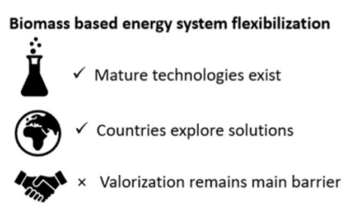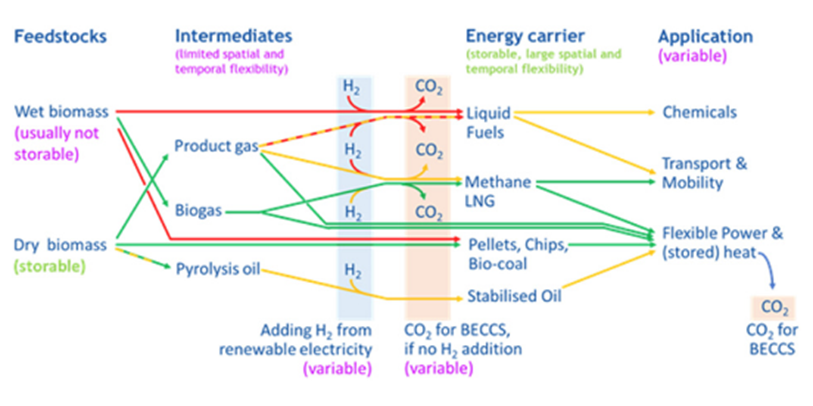Status of and expectations for flexible bioenergy to support resource efficiency and to accelerate the energy transition
Open access article in the Journal Renewable and Sustainable Energy Reviews, based on work performed within IEA Bioenergy Task 44.
https://authors.elsevier.com/sd/article/S1364-0321(22)00024-7
We can expect a remarkable expansion and cross-sectoral deployment of PV and wind power in the current decade. The intermittent nature of these renewables, however, will evoke growing challenges regarding matching energy supply and demand. Studies and strategies that aim to solve this challenge tend to neglect the flexibility potential of modern and sustainable bioenergy, despite this being the leading renewable energy resource today. The paper explores the current status of, and stakeholder expectations for, bioenergy flexibility, drawing on recent questionnaire data gathered in the IEA Bioenergy TCP to provide a technological and deployment status review for eleven countries.
There is a wide range of commercially available bioenergy technologies that can offer flexibility services. Sustainable biomass can be deployed for multiple services and benefits to the energy system under varying operating conditions and loads, contributing to energy security beyond the power grid. Flexibilization of the energy system is, so far, mainly associated with balancing production and consumption of renewable electricity only. However, bioenergy and bioeconomy are multisectoral and expectations extend far beyond just electricity, through the connection with the production of heat, renewable gas, transport fuels or biochemicals.
Yet, the prevailing barrier for multiplying flexible bioenergy options lies in missing tools to valorize flexibility services in general. Practical deployment continues to be seen as little more than a niche innovation mainly due to limited ‘landscape pressure’ and considerable challenges in translating systemic, macro-economic and societal gains into an economic profit on a business level. Considering the large variety of flexibility services, markets and frameworks have to be designed to sufficiently reflect the qualities and limitations of the different commodities or services. The benefits of flexibility services and sustainable bioenergy can be first and foremost evaluated on an integrated energy system level, for example, based on cost or GHG savings, internalizing security of supply, and overall system stability. The paper advocates for a heterodox energy economic debate to help settle fundamental questions about the effectiveness of different market designs based on empirical approaches, quantitative modelling, and basic analytical research.


Connected publications:
- Five cornerstones to unlock the potential of flexible bioenergy (November 2021) https://www.ieabioenergy.com/blog/publications/five-cornerstones-to-unlock-the-potential-of-flexible-bioenergy/
- Technologies for Flexible Bioenergy (August 2021) https://www.ieabioenergy.com/blog/publications/technologies-for-flexible-bioenergy/
- Expectation and implementation of flexible bioenergy in different Countries (March 2021) https://www.ieabioenergy.com/blog/publications/new-publication-expectation-and-implementation-of-flexible-bioenergy-in-different-countries/


